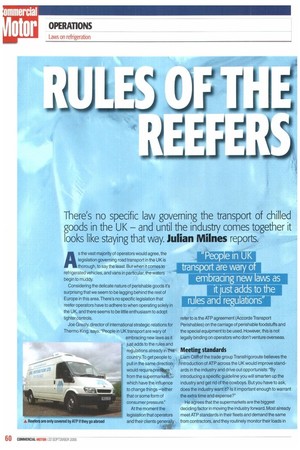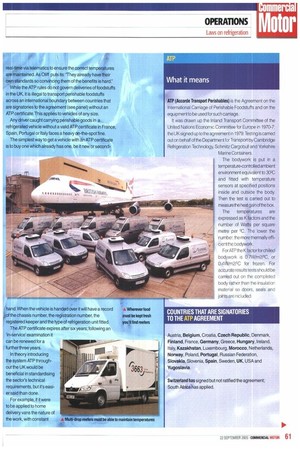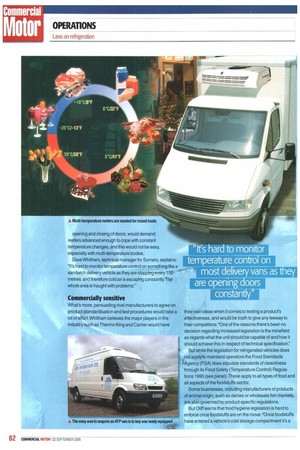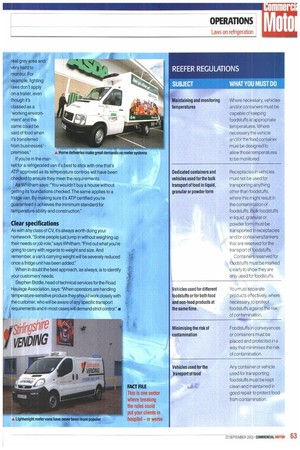' 1 3 1 m r i r rir;i4 1 pl r 1 r ipii r J
Page 68

Page 69

Page 70

Page 71

If you've noticed an error in this article please click here to report it so we can fix it.
There's no specific law governing the transport of chilled goods in the UK — and until the industry comes together it
looks like staying that way. Julian Millnes reports.
As the vast majority of operators would agree, the legislation govern lng road transport in the UK is thorough, to say the least. But when it comes to refrigerated vehicles, and vans in particular, the waters begin to muddy.
Considering the delicate nature of perishable goods its surprising that we seem to be lagging behind the rest of Europe in this area.There's no specific legislation that reefer operators have to adhere to when operating solely in the UK, and there seems to be little enthusiasm to adopt tighter controls.
Joe Grealy, director of international strategic relations for Thermo King, says: "People in UK transport are wary of embracing new laws as it just adds to the rules and regulations already in this country. To get people to pull in the same direction would require prec from the supermarkeE which have the influence to change things — either that or some form of consumer pressure!'
At the moment the legislation that operators and their clients generally refer to is the ATP agreement (Accorde Transport Perishables) on the carnage of perishable foodstuffs and the special equipment to be used. However, this is not legally binding on operators who don't venture overseas.
Meeting standards
Liam 01 if of the trade group Transfrigoroute believes the ;introduction of ATP across the UK would improve standards in the industry and drive out opportunists: "By introducing a specific guideline you will smarten up the industry and get rid of the cowboys. But you have to ask, does the industry want it? Is it important enough to warrant the extra time and expense?"
He agrees that the supermarkets are the biggest deciding factor in moving the industry forward. Most already meet ATP standards In their fleets and demand the same from contractors, and they routinely monitor their loads in real-time via telematics to ensure the correct temperatures are maintained. As Oliff puts its: They already have their own standards so convincing them of the benefits is hard," While the ATP rules do not govern deliveries of foodstuffs in the UK, it is illegal to transport perishable foodstuffs across an international boundary between countries that are signatories to the agreement (see panel) without an ATP certificate.This applies to vehicles of any size.
Any driver caught carrying perishable goods in a refrigerated vehicle without a valid ATP certificate in France, Spain. Portugal or Italy faces a heavy on-the-spot fine.
The simplest way to get a vehicle with an ATP certificate is to buy one which already has one, be it new or second hand. When the vehicle is handed over it will have a record Wherever food of the chassis number, the registration number, the must be kept fresh registered keeper and the type of refrigeration unit fitted. you'll find reefers The ATP certificate expires after six years; following an 'in-service' examination it can be renewed for a further three years.
In theory introducing the system ATP throughout the UK would be beneficial in standardising the sector's technical requirements, but it's easier said than done.
For example, if it were to be applied to home delivery vans the nature of the work, with constant Multi-drop reefers must be able to maintain temperatures opening and closing of doors. would demand reefers advanced enough to cope with constant temperature changes, and this would not be easy, especially with multi-temperature bodies.
Dave VVhitham, technical manager for Somers, explains: it's hard to monitor temperature control on something like a sandwich delivery vehicle as they are stopping every 100 metres and therefore cold air is escaping constantly.The whole area is fraught with problems."
Commercially sensitive
What's more, persuading rival manufacturers to agree on product standardisation and test procedures would take a lot of effort Whitham believes the major players in the industry such as Thermo King and Carrier would have their own ideas when it comes to testing a product's effectiveness, and would be loath to give any leeway to their competitors: "One of the reasons there's been no decision regarding increased legislation is the minefield as regards what the unit should be capable of and how it should achieve this in respect of technical specification."
But while the legislation for refrigerated vehicles does not apply to mainland operators the Food Standards Agency (FSA) does stipulate standards of cleanliness through its Food Safety (Temperature Control) Regulations 1995 (see panel). These apply to all types of food and all aspects of the foodstuffs sector.
Some businesses, including manufacturers of products of animal origin, such as dairies or wholesale fish markets, are also governed by product-specific regulations.
But Oliff warns that food hygiene legislation is hard to enforce once foodstuffs are on the move: "Once foodstuffs have entered a vehicle's cold storage compartment it's a real grey area and very hard to monitor. For example, lighting laws don't apply on a trailer, even though it's classed as a 'working environment' and the same could be said of food when it's transferred from businesses'
premises." A Home deliveries make great demands on reefer systems if you're in the mar ket for a refrigerated van it's best to stick with one that's ATP approved as its temperature controls will have been checked to ensure they meet the requirements.
As Whitham says: You wouldn't buy a house without getting its foundations checked. The same applies to a fridge van. By making sure it's ATP certified you're guaranteed it achieves the minimum standard for temperature ability and construction."
Clear specifications
As with any class of CV, it's always worth doing your homework. "Some people just jump in without weighing up their needs or job role," says Wh itham. "Find out what you're going to carry with regards to weight and size. And remember. a van's carrying weight will be severely reduced once a fridge unit has been added?'
When in doubt the best approach, as always, is to identify your customers' needs.
Stephen Biddle, head of technical services for the Road Haulage Association, says: "When operators are handling temperature-sensitive produce they should work closely with the customer, who will be aware of any specific transport requirements and in most cases will demand strict control," •










































































































































































































